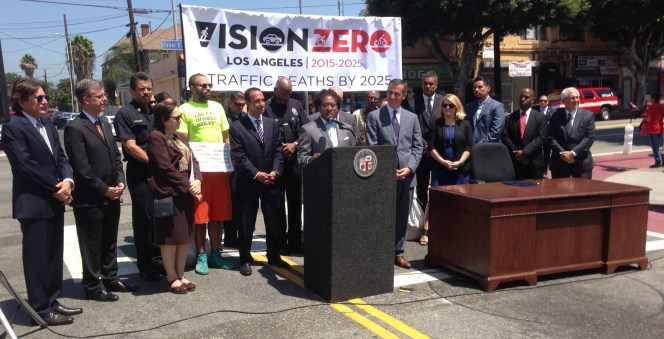A couple of weeks ago, I was visiting the Mar Vista Farmer's Market with my seven-year-old son. Seeing a group gathering petitions for Restore Venice Boulevard's demands that the road diet on Venice Boulevard be immediately ended, I turned off to go in through the side. Earlier in the week, a tweet condemning the person who wrote the weird, racist flyer that was the last straw for a friend and neighborhood councilmember was misinterpreted as being a condemnation of everyone who opposed the road diet. I'm sure I phrased it poorly, but my attempts to clarify had fallen on deaf ears. A lot of people involved in the Restore Venice Boulevard Movement were convinced I, a Board Member of the Mar Vista Neighborhood Council, had called them all assholes.
So, I tried to sneak around to get into the market without incident. I failed, and ended up in a shouting match with a woman I didn't recognize in front of my kid. While I can certainly hide behind the shield of "she started it," it wasn't my proudest moment. I'll spare you all the details, but this person and I have communicated over email and have put the issue behind us and (I think) we're both chalking it up as a misunderstanding and a teachable moment.
But after the incident, I've been pondering, "How did we get here?" My profile in Mar Vista has been pretty local to my involvement at my kids' school until I joined the Neighborhood Council. It's one thing to get yelled at by the crazed radio hosts John and Ken. It's another thing altogether to notice you've been transformed from the "guy that programs bike-to-school events" to some sort of nefarious person pushing a radical agenda to mess up people's commutes.
I have a few ideas on things we can all do, as advocates for safe streets and healthy communities, to move towards a more civil debate and help to spread information that might break into the media silos many people have built for themselves.
1. Recognize that any change to an existing street involves a trade-off, and will not be viewed as a win for everyone. The sad reality is that we've inherited a transportation network that was built to move as many cars as quickly as possible. Any changes to that reality will be met with resistance, as people experience longer commutes. Even if the change isn't that drastic, or returns to its original time over the long haul, the perception is that the change is causing people to lose precious time with their family, or friends, or pets, or whomever.
It's been a strategy for years to focus on the long-term gains that reconfiguring streets will bring to a community. One of the first things that we can do to recognize that, for many people, the long-term gain is a nebulous future. Right now, their commute time has been increased. That sucks.
A quick corollary to this point is that cut-through traffic increasing on parallel streets after a diet is often a terrible side effect of road diets. WAZE and other apps that help people "avoid traffic" has done a great disservice to people trying to make city roads a safer place by encouraging people to cut through residential streets. It just so happens that a disproportionately high percentage of these commuters want to treat these local streets as though they are the major roads they used to drive on.
2. Don't mock people who say something at public meetings because it sounds dumb/heartless. Instead, try to gently correct the record. At the meeting of the Mar Vista Community Council where we voted to continue to support the road diet, one speaker commented that one death every two years along the one-mile stretch that's seen a lane reduction didn't sound that bad. While this comment sounds horrific, consider how television viewers are bombarded with stories almost daily about the traffic death of the day and how many people that speak at these meetings aren't professional speakers. Instead of criticizing, we should set the record straight. If you do the math and Los Angeles experienced one death every two years per mile of road, that would be 3,250 road deaths a year, a far higher number than the ghastly 263 deaths experienced on L.A.'s streets in 2016.
3. Don't Feed the Trolls. I'm not saying don't engage with people online, but it's usually clear pretty early in a conversation when someone wants to have a discussion versus someone that wants to score points or have an argument on the Internet. Winning battles on Twitter or Facebook usually doesn't translate into any sort of policy win or changing any "hearts and minds."
In the same vein, remember the Internet can be forever. Even deleted posts on social media that might have felt good in the moment can come back to haunt you. And if you think that "winning" a fight online against a troll is a good feeling, it's an even better one to get said troll out of your life by ignoring or blocking them. Trust me.
4. Media bubbles are real, and it leads both sides of an issue to have different facts. It's true of presidential elections, it's true of local debates about road diets. We see this as the conditions on Vista del Mar for most of the day. They see this as the condition when they are using the road for their rush hour commute.
There's no easy answers to what will "win" a public debate on a road diet or other change to the transportation network towards the goal of creating a safer, more equitable, and cleaner transportation system. But, by taking the time to understand and recognize the point of view of the people who disagree with us is a worthy endeavor that I believe will bear fruit in the long-term.






